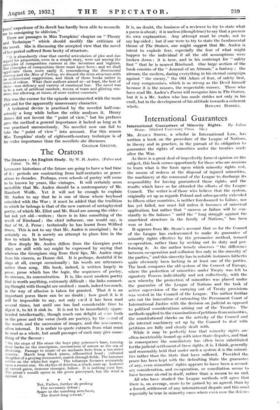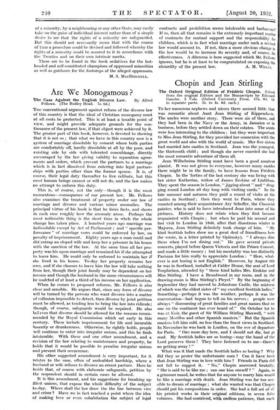International Guarantees
International Guarantees of Minority Rights. By Julius Stone. (Oxford University Press. 14s )
Ma. Jinaus STONE, a scholar in International Law, has written a book on the procedure of the League of Nations, in theory and in practice, in the pursuit of its obligation to guarantee the rights of minorities under the treaties made after the War.
As there is a great deal of imperfectly formed opinion on the subject, this book comes opportunely for those who are anxious to learn what is the basis upon which minority rights rest, the means of redress at the disposal of injured minorities, the machinery at the command of the League to discharge its responsiblity for having guaranteed those rights, and the results which have so far attended the efforts of the League Council. The writer is of those who believe that the system, originally set up as regards Poland and subsequently extended to fifteen other countries, is neither foredoomed to failure, nor has yet failed, nor must fail unless it becomes of universal application, but rather that " success or failure will be con- stantly in the balance " until the " long struggle against the anarchical structure in the family of Nations," has been won or lost.
It appears from Mr. Stone's account that so far the Council of the League has endeavoured to make its guarantee of minority rights effective by the persuasive method, termed co-operation, rather than by seeking out its duty and per- forming it. As the author tersely observes " the difference between co-operation and collusion lies only in the sincerity of the parties," and this sincerity has in notable instances hitherto quite obviously been lacking in at least one of the parties. The book compares the old system of the Concert of Europe, where the protection of minorities under Treaty was left to signatory Powers individually and not collectively, with the new whereby the protection of minorities was placed under the guarantee of the League of Nations and the task of active supervision of the carrying out of Treaty provisions was vested in the Council of the League. The author further sets out the innovation of entrusting the Permanent Court of International Justice with the decision on judicial as opposed to political considerations arising out of the Treaties. The methods applied to the examination of petitions from minorities, the constitutional checks on the activity of the Council and the internal machinery set up by the Council to deal with petitions are fully and clearly dealt with. While it may be perfectly true that minority rights arc often inextricably bound up with inter-State disputes, and that in consequence the conciliatory has often been substituted for the judicial settlement of these rights, it is, I think, generally and reasonably held that under such a system it is the minori- ties rather than the State that have suffered. Provided the peace has been kept with the defaulting State the guarantee of any, even minorities' rights appears to have been a second- ary consideration, and co-operation, or conciliation seems to have become an end in itself, rather than a means to an end.
All who have studied the League methods will agree that there is, on average, more to be gained by an agreed, than by a forced, settlement of any international dispute and this must especially be true in minority cases where even now the defence of a minority, by a neighbouring or any other State, may easily take on the guise of individual interest rather than of a simple desire to see that the rights of a minority are safeguarded. But this should not necessarily mean that with the course of time a procedure could be devised and followed whereby the rights of a minority could be assured to it in accordance with the Treaties and on their own intrinsic merits.
There are to be found in the book sedatives for the hot- headed and self-constituted champions of oppressed minorities as well as guidance for the footsteps of the alleged oppressors. M. S. MAcDoNNELL.































 Previous page
Previous page